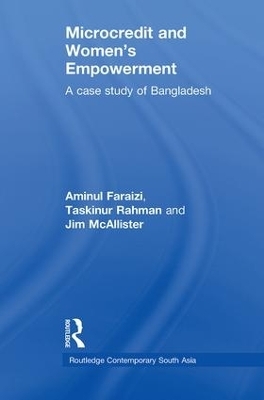
Microcredit and Women's Empowerment
A Case Study of Bangladesh
Seiten
2014
Routledge (Verlag)
978-1-138-84412-4 (ISBN)
Routledge (Verlag)
978-1-138-84412-4 (ISBN)
Using a case study of Bangladesh, and based on a long term participatory observation method, this book investigates claims of the success of microcredit, as well as the critiques of it, in the context of women’s empowerment. It confronts the distinction between women’s increasing wealth as a consequence of the success of microcredit programmes and their apparent non-commensurate empowerment, looking at two organisations (the Grameen Bank and the Bangladesh Rural Advancement Committee) as they operate in two localities in rural Bangladesh, in order to discover how enrichment and empowerment are often confused.
The book goes on to establish that the well-publicised success stories of the microcredit programme are blown out of proportion, and that the dynamics of collective responsibility for repayment of loans by a group of women borrowers – usually seen to be a tool for the success of microcredit – is in fact no less repressive than traditional debt collectors. This book makes a contribution to development debates; challenging adherents to more closely specify those conditions under which microcredit does indeed have validity, as well as providing insights relevant to South Asian Studies and Development Studies.
The book goes on to establish that the well-publicised success stories of the microcredit programme are blown out of proportion, and that the dynamics of collective responsibility for repayment of loans by a group of women borrowers – usually seen to be a tool for the success of microcredit – is in fact no less repressive than traditional debt collectors. This book makes a contribution to development debates; challenging adherents to more closely specify those conditions under which microcredit does indeed have validity, as well as providing insights relevant to South Asian Studies and Development Studies.
Aminul Faraizi is Senior Lecturer of Sociology in the Department of Behavioural and Social Sciences at CQUniversity, Australia. Taskinur Rahman is Chief Executive of the Assistance for Social Organization and Development (ASOD), Bangladesh. Jim McAllister is Honorary Research Fellow of CQUniversity, Australia.
1. The Empowerment Project 2. Microcredit as Empowerment Strategy 3. Unpacking Microcredit Discourses 4. Implanting Microcredit: BRAC and the Grameen Bank officers 5. Envisioning Microcredit 6. The False Promise: Microcredit and empowering poor women in rural Bangladesh
| Reihe/Serie | Routledge Contemporary South Asia Series |
|---|---|
| Zusatzinfo | 18 Tables, black and white; 24 Halftones, black and white |
| Verlagsort | London |
| Sprache | englisch |
| Maße | 156 x 234 mm |
| Gewicht | 249 g |
| Themenwelt | Sozialwissenschaften ► Soziologie ► Gender Studies |
| Sozialwissenschaften ► Soziologie ► Spezielle Soziologien | |
| Betriebswirtschaft / Management ► Spezielle Betriebswirtschaftslehre ► Bankbetriebslehre | |
| Wirtschaft ► Volkswirtschaftslehre | |
| ISBN-10 | 1-138-84412-8 / 1138844128 |
| ISBN-13 | 978-1-138-84412-4 / 9781138844124 |
| Zustand | Neuware |
| Haben Sie eine Frage zum Produkt? |
Mehr entdecken
aus dem Bereich
aus dem Bereich
Praxisnahe Einführung mit zahlreichen Fallbeispielen börsennotierter …
Buch | Softcover (2020)
Vahlen (Verlag)
CHF 34,85


